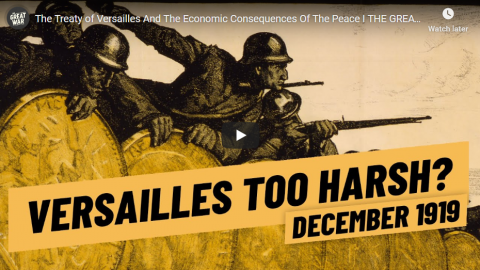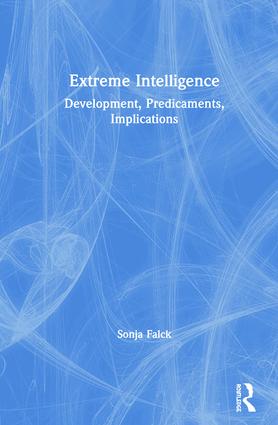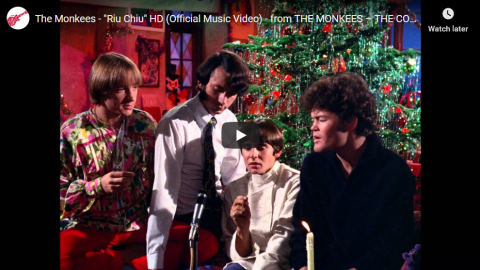The Great War
Published 19 Dec 2019Help The Great War and keep it free for everyone: https://patreon.com/thegreatwar
John Maynard Keynes was an economist and part of the Paris Peace Conference in 1919. He had high hopes for a new post-war order but when he realized what Georges Clemenceau, David Lloyd-George and Woodrow Wilson were planning, he resigned from the conference. And then wrote a book about it: The Economic Consequences of the Peace became a bestseller and is one of the best known critiques of the Versailles Treaty.
» SUPPORT THE CHANNEL
Patreon: https://www.patreon.com/thegreatwar
Merchandise: https://shop.spreadshirt.de/thegreatwar/» SOURCES
Demps, Lorenz and Materna, Ingo (eds.). Geschichte Berlins von den Anfängen bis 1945. Berlin, 1987.
Eichengreen, Barry. Golden Fetters. The Gold Standard and the Great Depression 1919-1939. New York 1995.
Horn. Britain, France and the Financing of the First World War, 2002.
Hudson, Michael. Trade, Development, and Foreign Debt: Volume 2. Pluto Press, London, 1992.
Hudson, Michael. Superimperialism: The Origins and Fundamentals of U.S. World Dominance. Pluto Press, London 2003.
Keynes, John Maynard. The Economic Consequences of the Peace. Harcourt, Brace and Howe, New York, 1919.
Kinzer, Stephen. The True Flag: Theodore Roosevelt, Mark Twain, and the Birth of American Empire. St. Martin’s Griffin, 2018
Shirer, The Rise and Fall of the Third Reich. 1960.
Skidelsky, Robert. John Maynard Keynes, 1883-1946: Economist, Philosopher, Statesman. Penguin Books, New York, New York, 2003.
Skidelsky, Robert. John Maynard Keynes Volume I — Hopes Betrayed. Penguin Books, New York, 1983.»CREDITS
Presented by: Jesse Alexander
Written by: Mark Newton
Director: Toni Steller & Florian Wittig
Director of Photography: Toni Steller
Sound: Toni Steller
Editing: Toni Steller
Mixing, Mastering & Sound Design: http://above-zero.com
Maps: Daniel Kogosov (https://www.patreon.com/Zalezsky)
Research by: Jesse Alexander
Fact checking: Florian WittigChannel Design: Alexander Clark
Original Logo: David van StepholdA Mediakraft Networks Original Channel
Contains licensed material by getty images
All rights reserved – Real Time History GmbH 2019
December 21, 2019
The Treaty of Versailles And The Economic Consequences Of The Peace I THE GREAT WAR 1919
Christmas In Tobruk (1943)
British Pathé
Published 13 Apr 2014Full title reads: “CHRISTMAS IN TOBRUK”.
Tobruk, Libya.
Several shots of Pathe cameraman Terry Ashwood in his pyjamas as he gets up from his bed in the desert. He looks into his Christmas stocking and reads his cards. Bell on Tobruk Church ringing. Various shots of sacks of mail being sorted at desert sorting post. Several shots of ruined buildings in Tobruk where the Tommies are having their own. They write Merry Xmas on the wall and seem to be enjoying themselves. Soldiers ironing their clothes, “dress up” set the table and serve dinner. Men sitting at table with “Merry Christmas” written on the wall behind them. Christmas feast. Christmas pudding with a twig instead of piece of holly. Men drinking. Terry Ashwood leaving building and it is “snowing”. Pan up to show the men ripping paper into small pieces and throwing it from the balcony.
(Mute & Track Negs.)
FILM ID:1071.21A VIDEO FROM BRITISH PATHÉ. EXPLORE OUR ONLINE CHANNEL, BRITISH PATHÉ TV. IT’S FULL OF GREAT DOCUMENTARIES, FASCINATING INTERVIEWS, AND CLASSIC MOVIES. http://www.britishpathe.tv/
FOR LICENSING ENQUIRIES VISIT http://www.britishpathe.com/
British Pathé also represents the Reuters historical collection, which includes more than 136,000 items from the news agencies Gaumont Graphic (1910-1932), Empire News Bulletin (1926-1930), British Paramount (1931-1957), and Gaumont British (1934-1959), as well as Visnews content from 1957 to the end of 1984. All footage can be viewed on the British Pathé website. https://www.britishpathe.com/
Expanding the definition again: “terms like nerd, geek, or boffin is hate speech”
Offensensitivity hits the eggheads:
Labeling super-smart people with terms like nerd, geek, or boffin is hate speech, and should be punishable as such, argues lecturer and Harley-Street psychotherapist Dr Sonja Falck.
Likewise wonk, smarty-pants, and know-it-all: these terms are “divisive and humiliating,” and the “last taboo,” the University of East London egghead said this week while promoting her new book about brainiacs. Such “anti-IQ” words set society’s Einsteins apart, she claimed, with the result that geeks end up “feeling like they’re a misfit and don’t belong.”
Calling someone a swot, whizkid, brainbox, smart-arse, or dweeb may seem “harmless banter,” but it is equivalent to hate speech, she reckons, and should be recognized as such in British law – with punishments including fines and imprisonment. “It is only with the benefit of hindsight and academic research that we realise how wrong we were,” she added.
That academic research includes her new book titled Extreme Intelligence, for which she interviewed 20 nerds for 90 minutes about when they realized they were so very clever.
She then embarked on a “contextual analysis of literature” and decided that calling someone a boffin was equivalent to the worst racial slurs. “The N-word was common parlance in the UK until at least the 1960s,” she said during her book launch, before noting that “other insulting slurs about age, disability, religion and gender identity remained in widespread use until relatively recently.”
Dr Falck does not have a chip on her shoulder, despite the fact that the whole idea behind the book stemmed from the fact that as a child she was offered a place at a school for gifted children but her mother turned it down because she feared it would result in her becoming socially difficult.
Repost – The Monkees – “Riu Chiu”
Uploaded on 15 Dec 2015
The Monkees perform “Riu Chiu” from Episode 47, “The Monkees’ Christmas Show”.
H/T to Kathy Shaidle for the link.
QotD: Blogging
Blogs exist to fill the important market niche of writing that is so dull that your eyes will burrow out of the back of your head to escape. People do read blogs, usually by accident, sometimes on a dare, but those readers are later mistaken for Mafia victims with what appears to be two holes in the back of their heads. On closer inspection, you might find their eyeballs clinging to the drapes directly behind them. Unless the cat gets them first.
Scott Adams, 2004-11-11.









